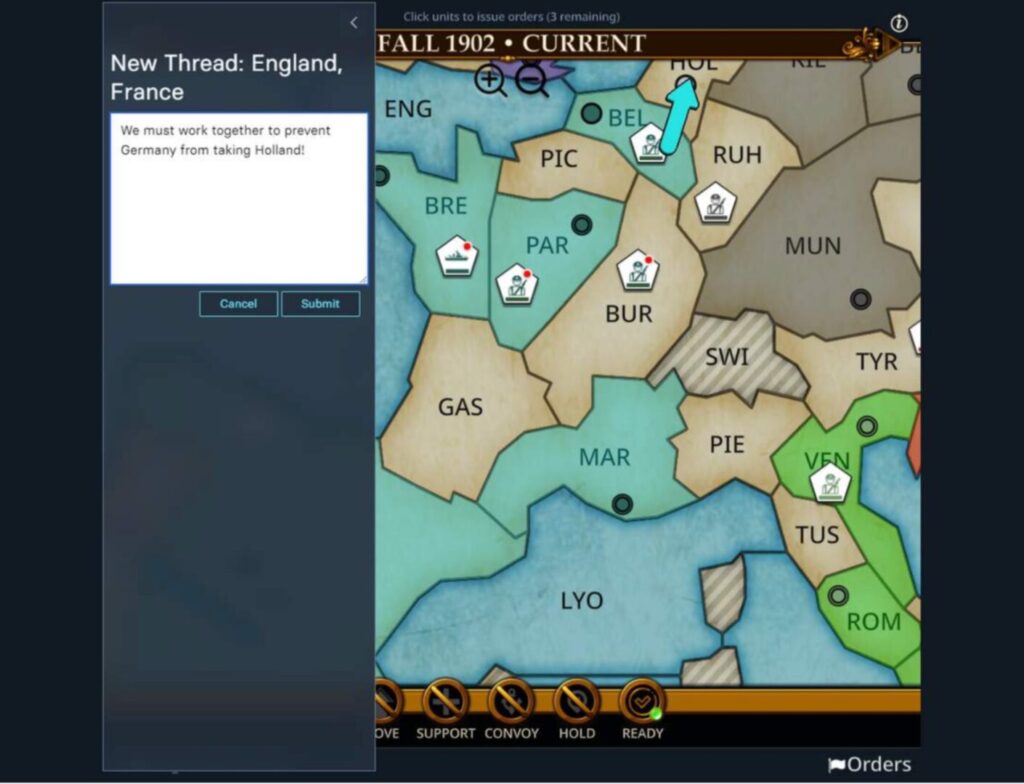Our variation of the famous (or perhaps infamous) classic wargame Diplomacy. Set in Europe, in the years leading to World War I, the game focuses on negotiation. While troop movements are important, it’s more important to carefully form and betray alliances with the other players. Each player controls one of the major European powers (Austria-Hungary, England, France, Germany, Italy, Russia, and Turkey), and each player aims to defeat the others by winning possession of a majority of strategic provinces marked as supply centers on the map. Each season consists of negotiations, movement and attack orders, and adjustments. As players take control of more supply centers, they can build more units.
Each power starts with control over certain key territories and units. Units are of two types: armies and fleets. Your objective in Seven Empires is to take control of key areas on the map, known as supply centers. These are crucial as they allow you to build more units and expand your influence. The beauty of Seven Empires lies in its simplicity of movement and combat, combined with the complexity of negotiating with other players.
Unlike many board games, there’s no element of chance in Seven Empires, so there are no dice rolls or card draws. Success in this game is determined solely by your ability to strategize, negotiate, and betray. Seven Empires is a game that challenges your tactical skills and your ability to read people. It’s about making and breaking alliances, sharing information, planning, and foresight. Its primary teaching purposes for Bedrock users are the security dilemma and the promises and perils of information.
Game Concept: Security Dilemma
A situation that can develop in international relations wherein a state taking actions to protect its own security induces tensions with other states unsure whether the actions taken are offensive or defensive. This can lead to escalation and conflict that no party desires. Seven Empires simulates the security dilemma.
The security dilemma is a concept found primarily in the fields of international relations and political science. It relates to situations where actions taken by a state to increase its own security cause reactions from other states, which in turn lead to a rise in tensions that can create conflict even when no side really desires it. This dilemma arises because the measures the state takes to increase its security can often be perceived as threatening by other states. The security dilemma is rooted in the anarchic nature and structure of the international system, where there is no central authority to protect states. In this system, states must rely on their own means to ensure their security.

Game Concept: Promises and Perils of Information
Information sharing is a double-edged sword in Seven Empires. The dynamics of truth, deception, and trust play a central role in who wins and who loses, just as in actual statecraft. Information sharing can aid in strategic planning but can also lead to indecision or betrayal.
The dynamics of truth, deception, and trust play a central role in who wins and who loses, just as in real-life statecraft. So, how can information sharing help you in Seven Empires? First, sharing information can be a powerful tool for building alliances. Players can forge alliances based on mutual interests, fears, and strategies. Second, effective information sharing can aid in strategic planning. Knowing more about the board’s situation, including others’ potential moves, can help players make more informed decisions.
Next, sharing accurate information can be a way to gain and maintain trust. In Seven Empires, where alliances can be fleeting, establishing trust can be critical for survival and success. Players can also use information sharing as a tool to mislead or misdirect others. Now, how can information sharing hurt you? One of the biggest risks in sharing information is the possibility of betrayal. Information shared in confidence can be used against the sharer, either by public revelation to all players, private revelation to another player or simply to anticipate a move in a way that hurts the sharer.

